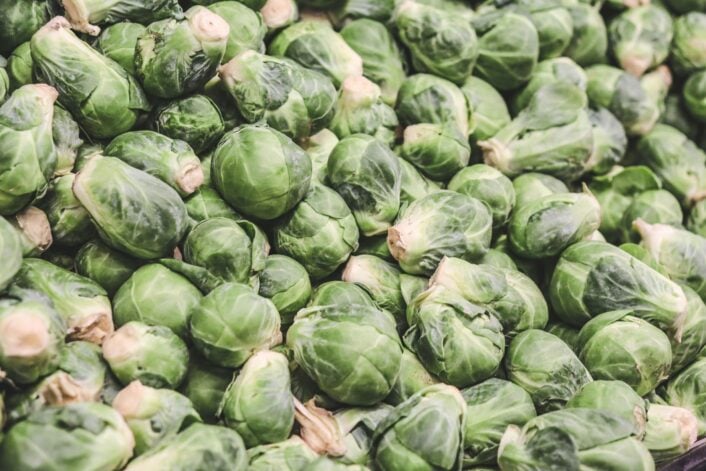
Brussels sprouts. The mere mention of their name can cause grimaces or cravings, depending on who’s asked. These miniature cabbages have a reputation for dividing people’s opinions, but what if there’s more to their story?
Let’s get into the world of Brussels sprouts and explore why some love them and others don’t.

Brussels sprouts aren’t just delicious (once cooked properly), they’re also packed with nutrients that benefit the body in numerous ways:
High in Fiber: Brussels sprouts are a great source of fiber, which keeps one feeling full for longer, aids digestion, and promotes gut wellness.
Vitamin Powerhouse: They’re brimming with essential vitamins, particularly vitamins C and K. Vitamin C is crucial for immune function, collagen production, and iron absorption. Vitamin K is vital for blood clotting and bone health.
Antioxidant Advantage: Brussels sprouts are rich in antioxidants, which combat free radicals in the body and may help reduce the risk of chronic diseases like heart disease and cancer.
There’s a genetic component to Brussels sprouts liking. Human taste buds have receptors for bitterness, and some people have a higher sensitivity thanks to a gene variation. This can make the bitter compounds in Brussels sprouts particularly unpleasant for those who have sensitive taste reception.
A large-scale 2022 GWAS study of food liking identified 1,401 significant food-liking associations which showed substantial agreement in the direction of effects with 11 independent cohorts.
The study used genetic correlations combined with genomic structural equation modeling to create a multi-level map of the relationships between different food preferences, highlighting three main domains that they define as “Highly palatable”; including desserts, meat, and savory foods, “Low caloric”; including vegetables, fruit, and whole grains, and “Acquired” foods including unsweetened coffee, alcohol, cheese, and strong-tasting vegetables.
LifeDNA references this study to analyze specific genes in order to provide personalized insights into Brussels sprouts liking. Genes with genetic variants associated with Brussels sprouts liking include SLC39A8, BNC2, BTBD11, and NCAM1.
Genetic factors have been found to correlate with various aspects of food preferences and could affect liking for food through different pathways related to brain development, energy use, and how we experience rewards. Understanding the role of genetic variation in food preferences could shed light on the genetic and neurological roots of food preferences and decisions, essential for developing more effective dietary plans and creating more appealing food options.
Aside from genetics, there are several other factors that can influence Brussels sprouts liking.
In conclusion, a combination of biology, experience, and cultural factors determines how someone feels about this little green vegetable.
Maybe not everyone will become inclined to Brussels sprouts liking. But with a little openness and some delicious recipes, people might just discover a newfound appreciation for these tiny green powerhouses. Here are some tips on preparing Brussels sprouts:
Brussels sprouts have transformed. Modern varieties are milder than their predecessors, thanks to selective breeding. And when it comes to cooking, there’s a whole world beyond boiling.
Roasting Brussels sprouts brings out their natural sweetness, caramelizing the outer leaves while keeping the interior tender. Pan-frying adds a delightful crispness. One can even shred them for a slaw or puree them into a creamy soup.
Discover a more vibrant you with the LifeDNA Nutrition Report, a personalized analysis of your DNA that offers tailored advice on nutrition based on your unique genetic makeup.
By understanding how your body reacts to and processes food, you can make smarter choices to reach your wellness goals and avoid potential health risks.
With practical recommendations and comprehensive insights into wellness beyond just food, the LifeDNA Nutrition report empowers you to take control of your well-being simply and effectively. Order your report today and take the first step towards a better you!
*Understanding your genetics can offer valuable insights into your well-being, but it is not deterministic. Your traits can be influenced by the complex interplay involving nature, lifestyle, family history, and others.
Our reports have not been evaluated by the Food and Drug Administration. The contents on our website and our reports are for informational purposes only, and are not intended to diagnose any medical condition, replace the advice of a healthcare professional, or provide any medical advice, diagnosis, or treatment. Consult with a healthcare professional before making any major lifestyle changes or if you have any other concerns about your results. The testimonials featured may have used more than one LifeDNA or LifeDNA vendors’ product or reports.


